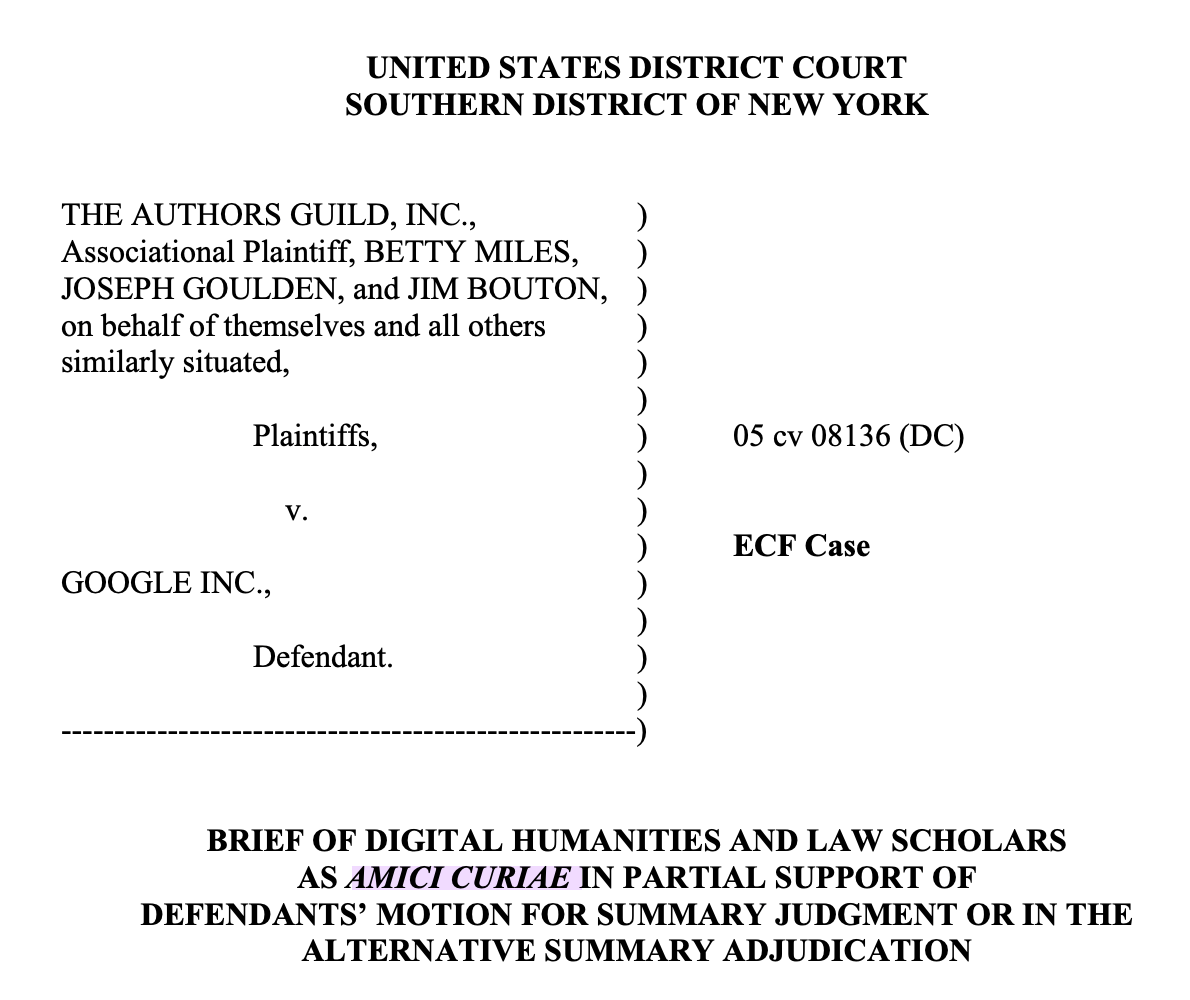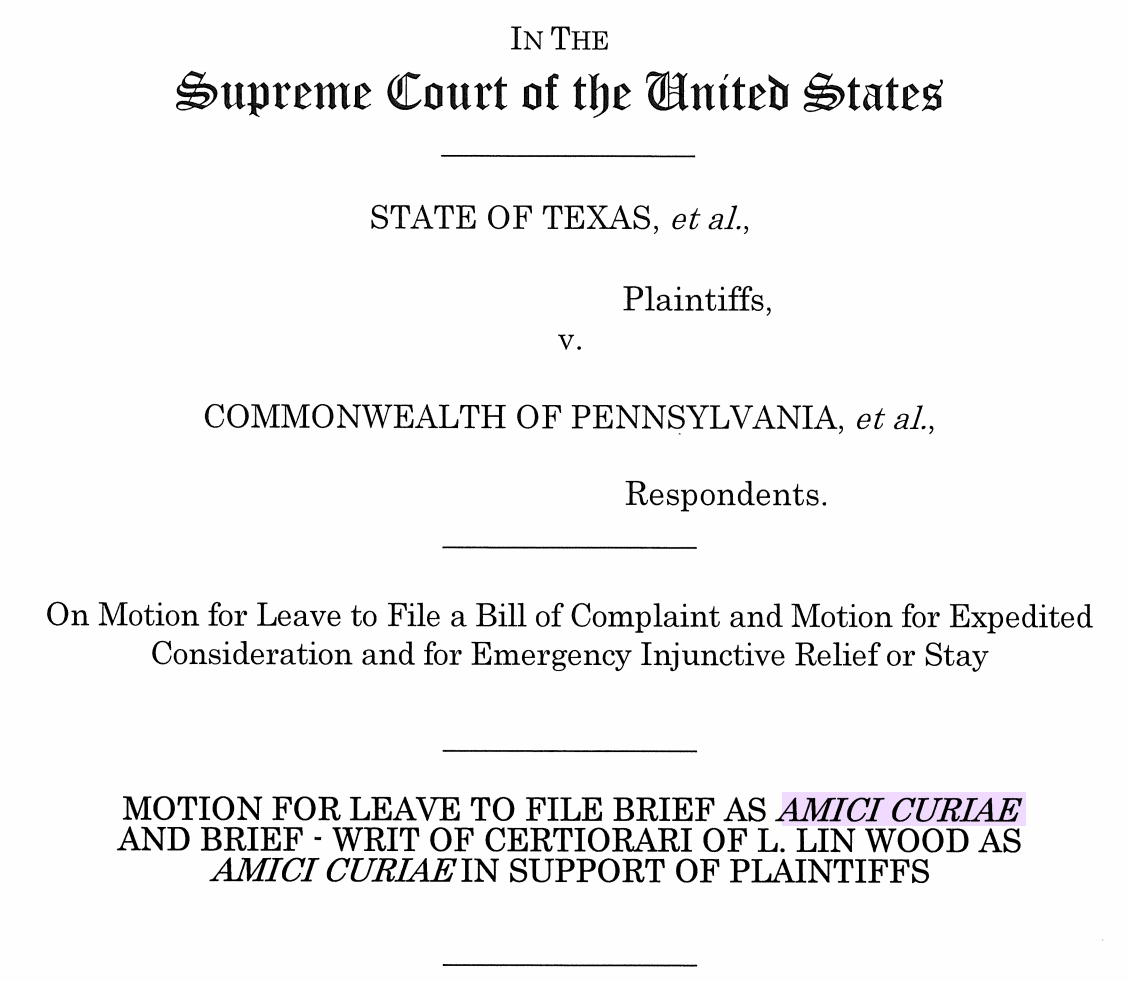Amicus, amici, whatever
« previous post | next post »
Lin Wood has gotten some social-media ridicule for various aspects of a brief that he filed in support of Texas's failed attempt to get the U.S. Supreme Court to throw out four other states' votes in the 2020 presidential election ("Supreme Court Rejects Texas Suit Seeking to Subvert Election", NYT 12/11/2020). The linguistically relevant issues have to do with (grammatical) number:
I'M SERIOUS HE MISSPELLED HIS OWN DAMN NAME.
Also, he apparently thinks he's plural. Either that or Latin is another item on his lengthy list of incompetencies. pic.twitter.com/awvQ1Cv0Ct
— Mike Dunford (@questauthority) December 11, 2020
An amicus curiae (literally, "friend of the court"; plural: amici curiae) is someone who is not a party to a case who assists a court by offering information, expertise, or insight that has a bearing on the issues in the case. The decision on whether to consider an amicus brief lies within the discretion of the court. The phrase amicus curiae is legal Latin.
So a document offering such assistance on the part of multiple authors will be described as coming from amici curiae, like this one:
But a brief from a single author would normally use the singular form amicus curiae.
The linguistically interesting thing about Wood's document is not so much that he used the Latin plural for his single-author submission:
Maybe Wood (or some underling) started from boilerplate copied from a genuinely multi-author submission, or maybe he started out with one or more colleagues who thought better of it. Or maybe he was just confused and in a rush.
The strange part, as Mike Dunford pointed out, is that on page 2, Wood spreads the plurality from amici to his name in apposition with it (Wood → Woods) and to the main verb (requests → request):
Perhaps the culprit was actually a grammar checking program (MS Word does blue-line "Amici is …"), or the same confused underling or both.
This is not the only typo/malapropism associated with the Texas court case — Twitter and Parler are full of calls for marshall law, succeeding from the United States, etc. I'm happy that so far, it's all talk, and we can focus on trivia like this.



chris said,
December 12, 2020 @ 1:31 pm
The plural verb also supports the collaborator-with-cold-feet theory. The name I have a harder time explaining, though.
Also, IANAL, but isn't a writ of certiorari normally something that the *court* grants, or refuses? Is it usual to see a party (or amicus) filing one?
Bloix said,
December 12, 2020 @ 2:11 pm
1) in the usual case, a party which lost its appeal in a lower court files a petition for a writ of certiorari. If the petition is granted, the writ issues to the lower court. It tells that court, step aside, we got this now.
2). The Texas case is not a usual case. There is no lower court opinion. Texas asserted that the Supreme Court could (and was required to) hear the case from the beginning pursuant to its “original jurisdiction,” a rarely used procedural mechanism that I won’t bore you with. Certiorari doesn’t come into it. The reference to a writ of certiorari is a mistake that demonstrates that Wood has no idea what he’s doing.
J.W. Brewer said,
December 12, 2020 @ 4:20 pm
The "certiorari" thing puzzled me as well, as it seemed worse to spell the word right in a procedural context where it made no sense than to spell the right-in-context word wrong. Turns out it was not wrong when you look at what Wood was actually asking for leave to do. Wood is himself the plaintiff in an unsuccessful lawsuit challenging the announced election results in Georgia (where he lives and votes) and had the previous week filed a petition seeking a writ of certiorari after losing his appeal to the Eleventh Circuit (which has jurisdiction over appeals from the lower federal courts in Georgia). So the purpose of this filing was to ask the court to also treat that pending cert. petition as an amicus brief in support of Texas' claims so that the Court could have the benefit (if any) of Wood's perspective without him needing to reedit his cert. petition into a regular-looking amicus brief (which would have meant taking out some stuff and adding other stuff).
There are definitely Latin phrases used in legal jargon that get commonly misspelled due to the low percentage of actual Latinity among working American lawyers and judges in recent generations. "De minimus" for "de minimis" is a particularly common one that I believe has made it into published judicial opinions, law review articles, and other places where you would have expected some considerable degree of proofreading. The -us variant "looks Latin" and you have to have actually taken Latin for it to be intuitively obvious why it would be the wrong inflected ending following "de." Although now that I think of it I'm not actually sure I can cogently explain why "minimis" rather than "minime" is right (i.e. why this is an instance where de takes the genitive rather than the ablative). You could I guess say mixing up amicus with amici is somehow more egregious (because people who've never taken Latin as such are more likely to know the sg./pl. pattern from other instances like alumnus/alumni not to mention misgeneralizations like octopus/octopi), but that seems a matter of degree. OTOH, as suggested already, cutting and pasting from another document where the plural made sense in context and then not editing it for the changed context is just as plausible as having drafted afresh but gotten muddled on which was singular.
Mary Ellen said,
December 12, 2020 @ 4:43 pm
If learned counsel had a transient attack of multiple personality while dictating the brief, all is explained. It had passed off by the time he got to "Wherefore..", and no one in the office notieed.
KevinM said,
December 12, 2020 @ 5:17 pm
@JM Brewer. So the title of the document is in a kind of headlinese, with the reader expected to supply the elided words, resulting in something like this:
"Motion To File Brief As Amic[us] Curiae And [To File The] Brief [Already Filed in Support Of Petition For] Writ of Certiorari of L. Lin Wood [In Smith v Jones] As [Brief of Amic[us]] Curiae in Support of Plaintiffs [In This Case]"
Rodger C said,
December 12, 2020 @ 5:24 pm
Although now that I think of it I'm not actually sure I can cogently explain why "minimis" rather than "minime" is right (i.e. why this is an instance where de takes the genitive rather than the ablative).
Minimus is second declension o-stem), not third (consonant-stem). The form is correct.
Bob Ladd said,
December 12, 2020 @ 5:33 pm
Surely minimis is an ablative PLURAL?
Jerry Friedman said,
December 12, 2020 @ 6:53 pm
I've mistyped my name (usually "Freidman"). Usually I'm not in a hurry to meet a deadline to save the country from imaginary electoral fraud, so I catch it.
ohwilleke said,
December 12, 2020 @ 6:53 pm
While misspelling your own name is never good practice, the royal "we" for a single author is the norm in scientific publications and in most academic disciplines, even though it is not the accepted practice in legal writing.
Julian said,
December 12, 2020 @ 8:24 pm
Yes, 'minimis' is the ablative plural of the second declension adjective 'minimus'. Some noun is understood.
'de minimis non curat lex' = about the-littlest/most-trivial ('things' understood) is-not-concerned the-law.
Michael Watts said,
December 12, 2020 @ 8:38 pm
Seems safe to assume that the implicit noun is rebus.
J.W. Brewer said,
December 12, 2020 @ 9:07 pm
KevinM: yes that's basically right. This was an unusual enough request (even though, in a less substantively weird context, it could have made practical sense) that being a little less elliptical might have helped.
Everyone else: by muddling my own Latin singulars and plurals I have perhaps helped to show how easy it is to do so in these fallen and decadent times. In lawyer-jargon English one quite frequently (probably more often than not) talks about a singular thing as the thing that is de minimis, but without adjusting the clipped version of the maxim where it's plural. That's presumably part of a broader pattern where if a word or phrase from inflected language A gets borrowed into less-inflected language B it gets borrowed in a "frozen" form and will not necessarily have its inflections tweaked depending on the language-B context in which it's used. (I may have also gotten sidetracked by a vague memory of having read somewhere that while it's generally quite unusual in Latin for prepositions to take the genitive there may have been some wandering in that direction in medieval Latin?)
Philip Anderson said,
December 13, 2020 @ 2:38 am
@J.W. Brewer
Why would you want to change the maxim just because you are concerned with only one thing? A maxim is usually frozen unless you are applying it to something different. In this case, if the law isn’t concerned with trivial matters in general, it automatically isn’t concerned with your particular one.
Cervantes said,
December 13, 2020 @ 8:16 am
Is it doofuses or doofi? I always have trouble with the Latin plurals.
KevinM said,
December 13, 2020 @ 10:38 am
@JM Brewer. Yes, that fits my experience (legal profession, US, NYC area). "De minimis," to begin with, almost always stands alone, like the title of a papal bull. Few even think about its origin as the first two words of a law-Latin maxim, so to inflect it would not occur to them, to the extent inflection would even make sense in the midst of an English sentence. It is thus used without inflection, and very commonly as a standalone adjective: "The offense, if any, is de minimis" – which, if you were to unpack it, would come out to something like "The offense, if any, is [of a sort to which we would apply the maxim] de minimis [non curat lex]."
Rodger C said,
December 13, 2020 @ 10:58 am
One affidavit, two affidaverunt?
Jerry Friedman said,
December 13, 2020 @ 5:07 pm
Cervantes: O doofora, o mores!
By the way, another of my common ways to mistype my name is "Jewrry", which is not an ethnic self-identification, though it would be correct, but hitting the "e" and the key to the left of it. (Or so I assume, and my unconscious isn't talking.) In the same way, "Woods" would be an easy typo for "Wood", and no spell-checker would catch it.
J.W. Brewer said,
December 13, 2020 @ 8:26 pm
There are plenty of common English-origin surnames that come in variants with and without an -s, and sometimes a given individual shifts back and forth. Keith Richards of the Rolling Stones was listed as Keith Richard on album covers and record labels for a portion of the band's career before eventually reacquiring the -s. And this was in the late 20th century when orthographic consistency was more of a thing than it had been in earlier eras (such as the 17th century when a remote ancestor of mine left behind a will spelling his surname three or four different ways over the course of the same document).
Joshua K. said,
December 14, 2020 @ 12:11 am
Eddie Kendricks of the Temptations also went back and forth between spelling his surname "Kendricks" and "Kendrick."
Daniel Barkalow said,
December 14, 2020 @ 5:53 pm
@Cervantes:
It's "doofodes" (with a pre-Great-Vowel-Shift long "e"), but so few people understand Scots Greek these days.
Jerry Friedman said,
December 18, 2020 @ 12:52 am
Daniel Barkalow: I think the PC term is "Doric".